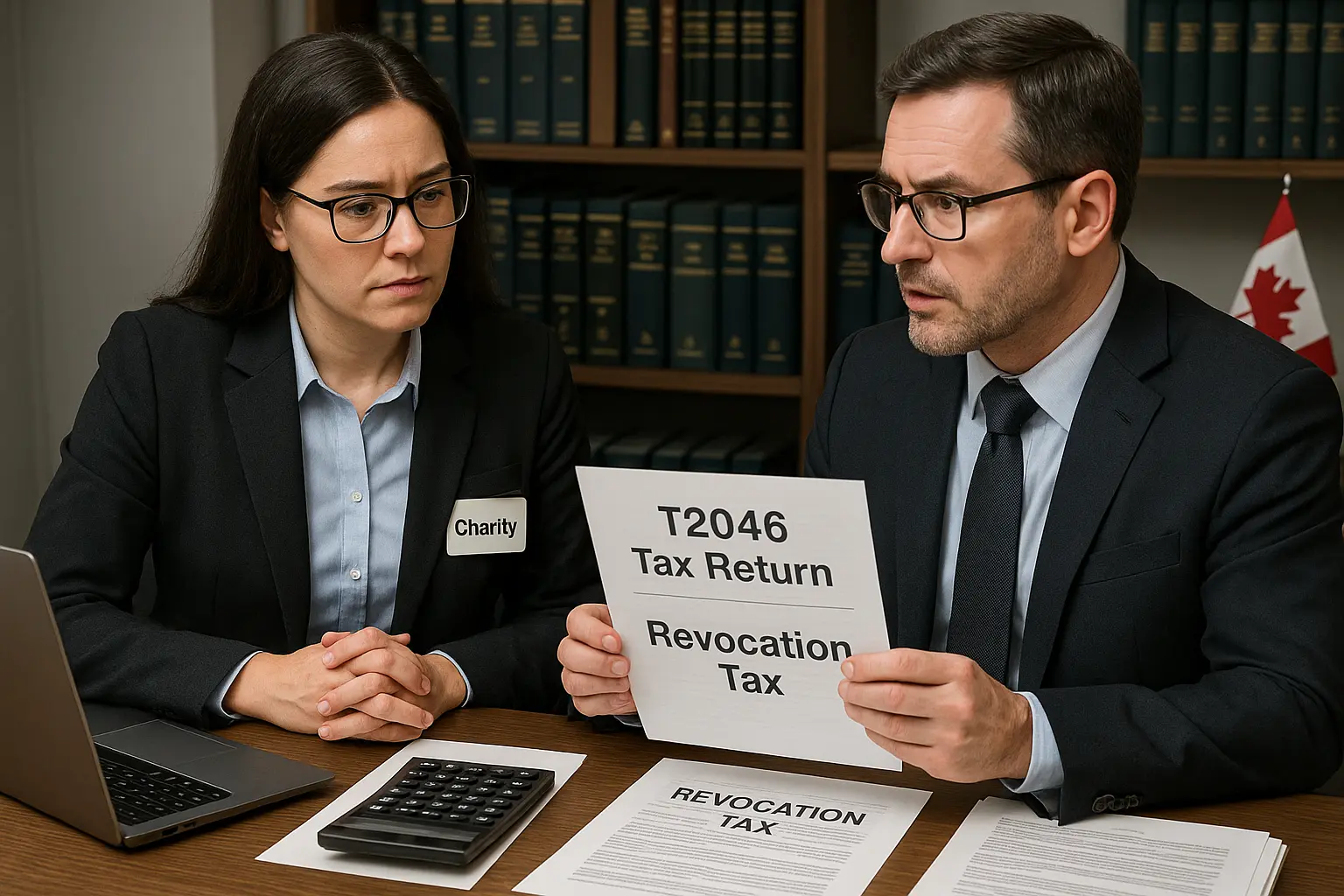Understanding Revocation Tax and the T2046 Tax Return in Canadian Charities

Managing a charity's financial responsibilities in Canada can be complicated, particularly regarding taxes. One crucial aspect that charities must understand is the revocation tax and the T2046 tax return. Not grasping these concepts could lead to profound financial implications for your charity, making it urgent for you to comprehend these tax regulations fully.
Here's a straightforward overview of these terms and how they affect charities.
What is Revocation Tax?
Revocation tax applies when a charity loses its registered status with the Canada Revenue Agency (CRA). This can happen for several reasons, such as failing to meet the requirements for maintaining charitable status.
The repercussions could result in losing tax-exempt status and the ability to issue tax receipts or even in the voluntary dissolution of the charity, which could significantly impact your charity's finances.
When a charity is revoked, it must pay a tax on the fair market value of its remaining assets at the time of revocation. This tax is calculated to ensure that the assets donated initially for charitable purposes are not improperly used for other purposes after the charity has lost its status.
Who is Affected?
The revocation tax primarily impacts registered charities that no longer meet the criteria set by the CRA. Charities must stay compliant with these regulations to avoid revoking their status and subsequent tax implications. Compliance is not merely a suggestion; it is essential.
What is the T2046 Tax Return?
The T2046 tax return, also known as the "Return of Income for a Charity that has ceased to be a registered charity," is the form that charities must complete when revoked. This return reports the revocation tax owed and details the charity's assets at the time of revocation.
Key Components of the T2046:
- Reporting Assets: The T2046 requires charities to list all assets remaining at the time of revocation. This includes cash, property, real estate or equipment, and other valuable assets like investments or intellectual property.
- Calculating the Tax: Charities must calculate the revocation tax based on the fair market value of these assets. This involves determining the current value of each asset and applying the tax rate, which is generally 100% of the amount owed.
- Filing Deadline: Charities must file the T2046 within six months of their revocation date. Meeting this deadline is vital to avoid additional penalties.
- Payment of Tax: Along with the T2046, charities must pay the calculated revocation tax by the filing deadline. Failure to do so can lead to further penalties and interest charges.
Why is This Important?
Understanding the revocation tax and the T2046 tax return is crucial for all charities. Not only does it help in managing the financial implications of losing registered status, but it also emphasizes the importance of compliance with CRA regulations. Charities that remain aware of their responsibilities can better protect their assets and ensure they continue serving their intended purposes.
Conclusion
Revocation tax and the T2046 tax return are critical components of the regulatory framework for Canadian charities. Charities facing revocation or seeking guidance should consult a tax professional or legal advisor. These professionals can provide expert advice on navigating the process, ensuring compliance, and effectively managing the situation.
Frequently Asked Questions
Quick answers to common questions about Canadian charity regulations and tax requirements.
What is the charity revocation tax in Canada?
The charity revocation tax is a penalty tax equal to 100% of the charity's remaining property value, imposed when the Canada Revenue Agency revokes a charity's registration for serious non-compliance with regulatory requirements.
Do Canadian charities file tax returns?
Yes, all registered charities in Canada must file an annual T3010 Registered Charity Information Return within six months of their fiscal year-end to maintain their charitable status.
What is the tax refund for charitable donations in Canada?
Canadian donors receive tax credits rather than refunds for charitable donations. The federal credit is 15% on the first $200 donated and 29% (or 33% for high-income earners) on amounts over $200, plus additional provincial credits.
What are the four categories of Canadian nonprofits?
The four main categories of Canadian nonprofit organizations are registered charities, nonprofit organizations (NPOs), nonprofit corporations, and unincorporated associations, each with different regulatory requirements and tax implications.
What are the four criteria for charity status in Canada?
To qualify for charitable status in Canada, an organization must meet four essential criteria: it must have exclusively charitable purposes (advancing education, religion, poverty relief, or community benefit), provide public benefit to the community or a sufficient segment of it, operate exclusively for charitable activities, and function as a nonprofit entity without distributing profits to members or directors.



